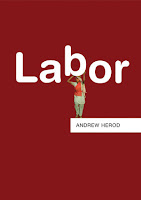Another short post sent whilst in the midst of writing-up my thesis (and today hold-up at the British Library) and to plug a new book. I have been reading and re-reading a lot of the output of Andrew on labour geography (here's his profile: http://tinyurl.com/yb6kd7u8) and for those unsure of what it meant by labour geography, Herod states:
The notion of “spatial praxis” is firmly on the intellectual agenda in human geography. The making of the economic and social landscape in particular ways is now recognized as being fundamental to the articulation of political power (cf. Harvey, 1982; Soja, 1989; Lefebvre, 1991). In this paper I argue, however, that whilst they recognize landscapes are socially constructed, many economic geographers and theorizers of the geography of the capitalist space-economy — both mainstream and Marxist — have tended either to ignore the role of workers in making the economic geography of capitalism or have frequently conceived of them in a passive manner. Although during the past two decades economic geographers have generated a considerable literature which seeks to understand how capital attempts to make the geography of capitalism in particular ways to facilitate accumulation and the reproduction of capitalist social relations, there has been much less work which examines and attempts to theorize explicitly how workers actively shape economic landscapes and uneven development. Labor’s role in making the economic geography of capitalism has been rendered largely invisible by the analyses both of traditional mainstream neoclassical economic geographers and also, ironically, by many Marxists, for both approaches primarily present economic geographies devoid of workers as active geographical agents. Second, and following from above, I wish to return agency to workers in the literature on the development of economic geographies. This means conceptualizing labor not merely in terms of “factors” of location or the exchange value of “abstract labor” but to treat working class people as sentient social beings who both intentionally and unintentionally produce economic geographies through their actions — all the while recognizing that they are constrained (as is capital) in these actions.
If interested you can read the entire article here: http://sites.middlebury.edu/igst404/files/2014/01/Herod-Labors-Spatial-Fix.pdf
Herod's focus on labour geography is an important feature of characterising a new labour internationalism and alongside issues of worker and activist agency, has been critical to my thesis.
It is in the context of agency and Herod's focus on "working class people as sentient social beings" that Herod has approached his new book, which will be published in October by Wiley: http://eu.wiley.com/WileyCDA/WileyTitle/productCd-0745663869.html
The blurb for the new book reads:
Labor is the source of all wealth. Without workers, the world's natural resources cannot be transformed into finished goods and services cannot be delivered. Labor, though, is a uniquely important resource for the very simple reason that working people have sentience. Whilst a business might seek to employ workers in much the same way as it does any other resource, unlike these other resources labor is capable of altering its own conditions of existence and so of challenging how it is used by others. In this book, Andrew Herod offers an original and wide-ranging analysis of labor as a multi-faceted and truly global resource. Opening with a rich overview of the migration streams and demographic trends that have shaped the planetary distribution of labor, he goes on to explore how globalization and the growth of precarious work are impacting working people's lives. A wide range of examples is examined to illustrate the ongoing struggles faced by workers worldwide – from forced labor and child labor in West Africa's cocoa and southeast Asia's shrimping industries to the labor practices affecting so-called 'knowledge workers'. Herod concludes by surveying some of the ways in which working people are taking action to improve their lives, including forming trade unions and other labor organizations, occupying factories in places like Argentina and Greece, and establishing anti-sweatshop campaigns. This book is a must read for anyone interested in understanding the state of labor in today's global economy.
Looks like a fascinating book and at £14.99 for the paperback, relatively cheap to purchase - and much, much cheaper than similar texts on the plight of the global working class.
If you do get your hands on a copy please post your thoughts in response to this post.
In Solidarity
Ian

No comments:
Post a Comment